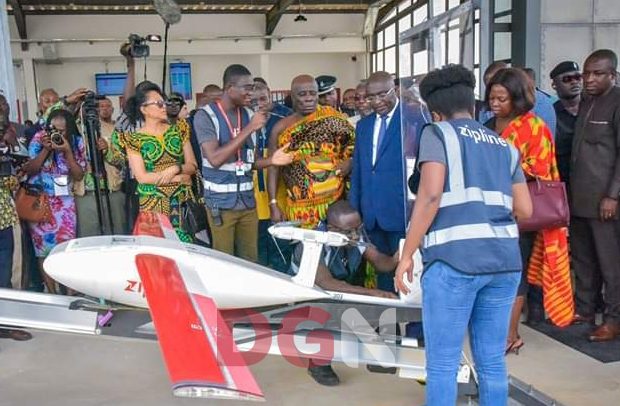The drone being prepared for take off
Vice-President Dr Mahamudu Bawumia yesterday launched Ghana’s first drone delivery centre at Omenako, a village near Suhum in the Eastern Region.
The event, which paves the way for the construction of the remaining three out of the scheduled four facilities by the end of this year, was graced by the Okyenhene, Osagyefo Amoatia Ofori Panin II.
Operations
The centre would use drones to make on-demand emergency deliveries of 148 different vaccines, blood products and life-saving medications.
It will also operate 24 hours a day, seven days a week from four distribution centres – each equipped with 30 drones and deliver to 2,000 health facilities serving 12 million people across the country.
Altogether, the four distribution centres, when operational, are each expected to make up to 500 on-demand flights a day.
Excitement
An elated Vice-President Dr Bawumia said: “The excitement today is for two reasons – first, we are now using technology to increase the access of Ghanaians to one of the basic public services that every citizen deserves. Second, we are using technology to solve a major problem in our health delivery service to those in remote areas that cannot be reached easily by roads.”
Apart from that, he said “we can now prevent the death of the mother in labour who needs blood. We can now deliver critical medicine to regional and district hospitals in the shortest possible time.”
“I am personally excited because today Ghana joins other countries in using drone technology to deliver healthcare services, and we are also launching the biggest medical drone delivery system globally,” he said, insisting that “the use of drones is presenting a significant opportunity in changing the health delivery needs of people around the globe.”
“What we are doing is making it easier to deliver those essential healthcare products to hospitals and other health facilities across the country during emergencies.
“This will save the lives of people who may have otherwise lost their lives through childbirth, snake bites, accidents and other life-threatening emergencies,” he stated with joy.
For him, the launch of the ‘Fly to Save a Life Project’ is a dream come true.
He added that “it’s only when citizens are healthy that they can work and contribute to the development of the economy”.
“One of the biggest pillars of this government has been how to grow this country without leaving anyone behind; inclusiveness, and one of the ways we are working on is how to use technology to advance our development, improve the ways we do things in our offices and how to improve citizens access to and delivery of the public services they need no matter where they live in this country,” he emphasised.
The Chief Executive Officer (CEO) of Zipline, Keller Rinaudo, revealed that “millions of people across the world, in both developed and developing countries die each year because they can’t get the medicine they need when they need it.”
Globally, he indicated that access to vital health products worldwide had been hampered by the last mile problem – the difficulty in supplying medicine from central storage to remotely located patients when and where they need it.
Services
Health workers place orders by texting messages and receiving deliveries in 30 minutes on average. Zipline’s drones take off and land from Zipline’s distribution centres, requiring no additional infrastructure at the clinics they serve.
The drones fly autonomously and can carry 1.8 kilos of cargo, cruising at 110 kilometres an hour, and have an all-weather round trip range of 160 kilometres. Each Zipline distribution centre can deliver to an area of 20,000 kilometre squares.
In Ghana, this means that each distribution centre will serve 2-5 million people.
Deliveries are made from the sky, with the drone descending to a safe height above the ground and releasing a box of medicine by parachute to a designated spot at the health centre it’s supposed to serve.
By Charles Takyi-Boadu, Presidential Correspondent


